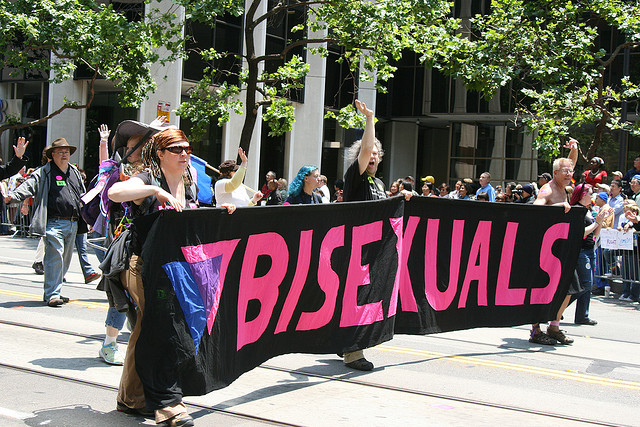Fighting To Be Seen: Why Bisexual Erasure Matters

However, I am a bisexual woman of color in a long-term relationship with a white man. Does that make me less bisexual? Does that make me less of a woman of color?
The bisexual community has a long-standing history of identity erasure in the LGBTQ community and outside of it. I'll never forget one of my close girl friends describing me as "mostly straight" and how I laughed and agreed with her in order to avoid having to explain what it meant to be bisexual. One of my greatest fears is marrying a straight, white man and having this wonderfully complicated part of my identity silenced -- and me letting it happen. I've worked hard to come to terms with who I am and being proud of it -- but consistently, I'm out in a world where you're either in a gay marriage or a straight one, as if nothing could complicate marriage besides being of the same sex.
Many LGBTQ spaces are still somewhat apathetic towards bisexual identities for fear that bisexuality is a "just a phase" for some, instead of a lifelong struggle. Bisexuals have to identify themselves always, because our physical or monogamous relationships never account for our full identities. Think of the shows or movies that portray women as “ex-lesbians” after they begin relationships with men, as if they can’t be attracted to both women and men. When was the last time you watched a TV show with a self-identified bisexual woman of color besides "Orange is the New Black?" Better, when was the last time you watched a movie in which the bisexual character wasn't asked to join a threesome?
READ MORE: A First-Timer On L.A. Pride
Being a woman of color who is neither black nor Latina comes with its own set of identity crises. Technically, in every checkbox situation, I'm Asian. However, there is no checkbox for "Indian Muslim whose parents were born and raised in Africa" and I often feel lost because of it. How can I articulate my identity through the lens of a person of color when so many ethnic identities are lumped together? How can I work to be conscious not to equate the struggles of my black and Latina sisters while giving strength to my own narrative as an Asian immigrant from Canada?
All of these identities become complicated because I am in love with a white man. Many of my progressive friends can tolerate my own progressive ideology until we get to a conversation that ends with them spitting, "why don't you ask your boyfriend how he can..." But my boyfriend is not only progressively minded on issues of race and sexuality, but was also raised in a low socioeconomic neighborhood that led him to the military before he was able to get out and get his B.A. from the University of California, Berkeley. His identity often rivals my own in complexity. My boyfriend may be a man but he has never trivialized my bisexual identity, treated it as a way to satisfy any of his fantasies or tried to convince anyone that I'm any less bisexual by loving him. My boyfriend may be white but he has never oversimplified my racial or ethnic identity, always checks his own privilege in our relationship and always works to understand my history before understanding my present.
All of that said, this isn't a defense of my boyfriend. It's a defense of myself and my ability to choose. I am not erasing my own bisexual identity by dating a man, I am celebrating that I've made a choice to love whomever I want to love. I am not erasing my anger at institutionalized racism by dating a white man, I am working to create community and challenge people outside my circles to better understand my culture and my identity.
That said -- shout to all of my pansexual, intersex, transgender, questioning, intergender, asexual and other lesser-known LGBTQ+ identity friends. We are not mythical, we are not silent and we will be seen.
The "War at Home" is a project of co-columnists Corinne Gaston and Maya Richard-Craven to examine and discuss contemporary issues of discrimination, violence and social injustice within American borders.
Contact Guest Contributor Safeena Leila Mecklai here; or follow her on Twitter.



